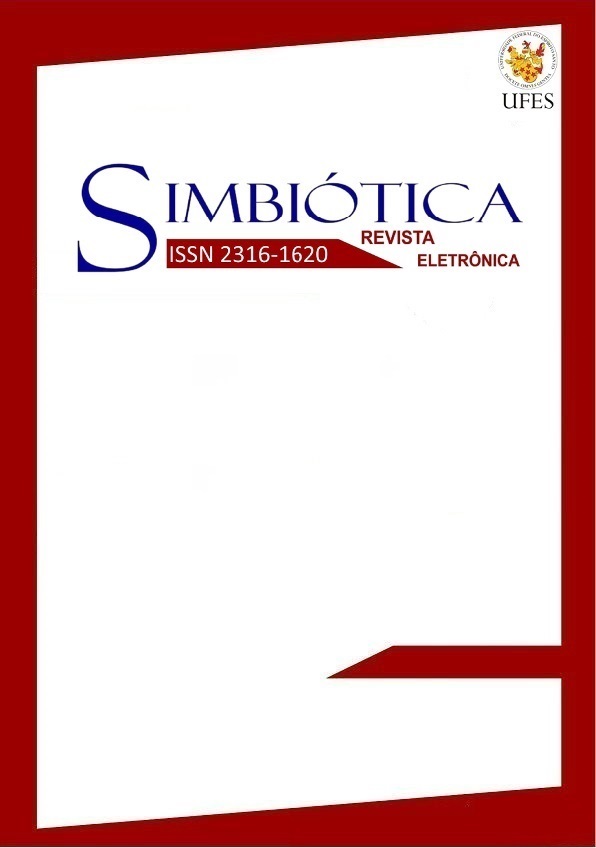A questão da raça no século XIX e no romance Palmares (1885), de Joaquim de Paula Souza
DOI:
https://doi.org/10.47456/simbitica.v9i2.39248Abstract
Publicado inicialmente no jornal A Constituinte, entre maio e julho de 1880, o romance Palmares, escrito pelo médico, fazendeiro e historiador paulista Joaquim de Paula Souza, ganharia sua primeira e única versão em livro cinco anos depois. Embora tenha como tema a vida dos paulistas do tempo colonial, aos quais se atribuiu a destruição de Palmares, essa obra também dialoga com seu contexto de produção e circulação, marcado pelo movimento abolicionista e pela presença ascendente das teorias cientificistas nos discursos dos intelectuais brasileiros. Dessa forma, sob a luz da historiografia que estuda o final do século XIX e discute essas teorias no Brasil, a proposta do artigo é analisar Palmares e compreender como um membro da elite de São Paulo percebia os diferentes grupos raciais.
Palavras-chaves: Romance; Fonte Histórica; Paulista; Teorias Cientificistas.
Abstract
Initially published in the newspaper A Constituinte, between May and July 1880, the novel Palmares, written by the Paulista physician, farmer and historian Joaquim de Paula Souza, would soon have its first and only book version five years later. Although it has as theme the life of the Paulistas of the colonial period, to whom the destruction of Quilombo dos Palmares was attributed, this work also dialogues with its context of production and circulation – distinguishable by abolitionist movement and by rising presence of scientific theories among the debates of Brazilian intellectuals. Thus, under the historiography light that studies the end of the 19th century and these theories in Brazil, the aim of the article is to analyze Palmares and comprehend how a member of the São Paulo elite observed different racial groups.
Keywords: Novel; Historical Resources; Paulistas; Scientific Theories.
Resumen
Publicada inicialmente en el diario A Constituinte, entre mayo y julio de 1880, la novela Palmares, escrita por el médico, hacendado e historiador paulista Joaquim de Paula Souza, luego tendría su primera y única versión en libro cinco años después. Si bien su tema es la vida de los paulistas de la época colonial, a quienes se atribuye la destrucción de Palmares, esta obra también dialoga con su contexto de producción y circulación, marcado por el movimiento abolicionista y la creciente presencia de teorías científicas en los discursos de intelectuales brasileños. Así, a la luz de la historiografía que estudia el final del siglo XIX y discute estas teorías en Brasil, el objetivo del artículo es analizar Palmares y comprender cómo un miembro de la élite paulista observaba los diferentes grupos raciales.
Palabras-claves: Novela; Fuente Histórica; Paulista; Teorías Científicas.
Downloads
Downloads
Published
How to Cite
Issue
Section
License
Copyright (c) 2022 Jaqueline Marinho dos Santos

This work is licensed under a Creative Commons Attribution-NonCommercial 4.0 International License.
Autores que publicam nesta revista concordam com os seguintes termos:
a. Autores mantém os direitos autorais e concedem à revista o direito de primeira publicação, com o trabalho simultaneamente licenciado sob a Creative Commons - Atribuição-NãoComercial 4.0 Internacional.
b. Compartilhar - copiar e distribuir o material em qualquer meio ou formato.
Adaptar - remix, transformar e construir sobre o material para qualquer finalidade, inclusive comercial.
c. Autores têm autorização para assumir contratos adicionais separadamente, para distribuição não-exclusiva da versão do trabalho publicada nesta revista (ex.: publicar em repositório institucional ou como capítulo de livro), com reconhecimento de autoria e publicação inicial nesta revista.
d. Autores têm permissão e são estimulados a publicar e distribuir seu trabalho online (ex.: em repositórios institucionais ou na sua página pessoal) a qualquer ponto antes ou durante o processo editorial, já que isso pode gerar alterações produtivas, bem como aumentar o impacto e a citação do trabalho publicado (Veja O Efeito do Acesso Livre).
Authors who publish in this journal agree to the following terms:
a. Authors retain the copyright and grant the magazine the right of first publication, with work simultaneously licensed under the CCreative Commons - Atribuição-NãoComercial 4.0 Internacional.
b. Share - copy and distribute the material in any medium or format.
Adapt - remix, transform and build on the material for any purpose, including commercial.
c. Authors are authorized to take additional contracts separately, for non-exclusive distribution of the version of the work published in this journal (eg, publish in institutional repository or as a book chapter), with acknowledgment of authorship and initial publication in this journal.
d. Authors are allowed and encouraged to publish and distribute their work online (eg.: in institutional repositories or on their personal page) at any point before or during the editorial process, as this can generate productive changes as well as increase the impact and the citation of the published work (See The Effect of Free Access).














